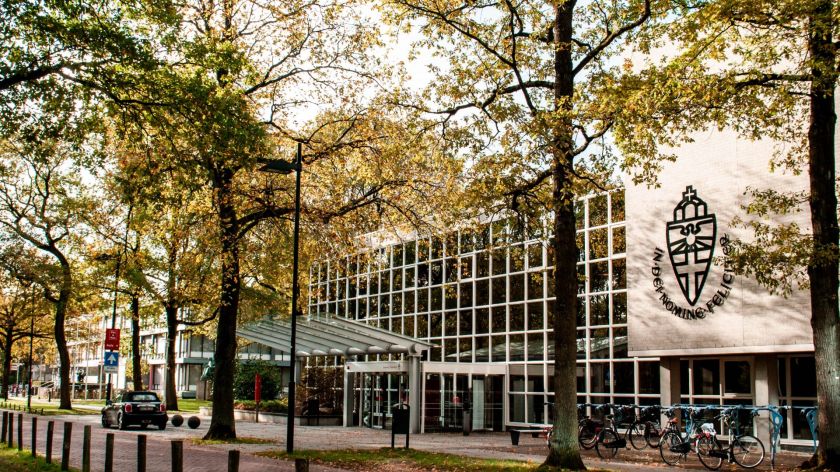Researchers want to revive participational bodies, plan for an academic citizens’ council
-
 De Aula. Foto: Diede van der Vleuten
De Aula. Foto: Diede van der Vleuten
Employee participation at Radboud University needs to change. This is what members of the former Recognition and Appreciation Committee write in an open letter. They call for an alternative way of participation: an academic citizens' council.
‘By installing a citizens’ council, Radboud University can show that it takes employee participation seriously.’ That is the message of AI scientist Frank Léoné in an open letter (in Dutch, ed.) addressed to the Executive Board, which he wrote together with professors Paula Fikkert and Arnoud Lagendijk.
Especially when it comes to the topic of recognition and appreciation, there is still much to be gained in terms of employee participation, Léoné, Fikkert and Lagendijk conclude. The authors, all former members of the now disbanded Recognition and Appreciation Committee at Radboud University, want to change that by implementing a supplementary citizens’ council.
R100
In their letter, the authors have named the academic citizens’ council ‘R100’, in reference to the number of members and the university’s age. The R100 deals with topics related to recognition and appreciation that are too sensitive or controversial for the existing participation councils. The citizens’ council thus functions as an additional advisory body with regard to this topic.
Employees are admitted into the R100 based on a lottery system. In doing so, there must be sufficient diversity within the group in terms of function, faculty, and gender. ‘Thus, the R100 includes a wide range of employees with diverse perspectives who can arrive at a broadly supported opinion in a safe, independent environment’, says Léoné.
‘Thus, the R100 includes a wide range of employees with diverse perspectives’
The advice to come out of the R100 ends up in the hands of the boards and should become the guideline for new policies. If the board does not want to adopt the advice, it should be able to publicly justify it, is the idea.
The result of the R100? Shared responsibility among employees, a widely supported proposal to improve policy and increased involvement – which the initiators believe is currently lacking at Radboud University.
Human touch
It would be a tremendous change of course for the policy-making process at the university. According to the authors of the letter, their plan ensures that more perspectives are considered when creating policies. ‘Currently, there is a chance that pressing but delicate issues are rather avoided than tackled. Because what might be a pressing issue for one person may not be that at all for another. The people currently discussing this, experience a relatively small portion of the problems. But at the same time, they are a big part of the solution’, states Léoné.
According to Léoné, the bulk of established scientists is used to focusing on a research career and competition. There is too little attention being paid to education, collaboration, and above all: the human touch. ‘In other words: attention to the enormous work pressure, diversity, inclusiveness, and safety. PhD candidates, postdocs, and lecturers all bear the brunt of this.’
Culture of engagement
Radboud University conducts a different Recognition and Appreciation policy at each faculty. According to Léoné, there is a risk that sensitive issues are lost out of sight as a result, because the faculty in question dismisses problems as ‘irrelevant’. As a result, sensitive issues such as the quality of leadership and workplace safety remain difficult to discuss.
A cultural change is therefore badly needed, Léoné believes. Most importantly: tackling the culture of engagement. ‘At the moment, comments are often very harsh, without taking emotions into account. It is also very difficult to give open feedback to managers and colleagues because the environment is not safe enough to do so.’
An overarching R100, which transcends faculty boundaries, could address this, according to the letter writers.
Radboud Reflects
Assistant professor of Artificial Intelligence and former member of the Recognition and Appreciation Committee Frank Léoné will discuss the dire situation of employee participation in Nijmegen together with associate professor of public administration Marlies Honingh during a Radboud Reflects lecture this afternoon.
This year, for instance, student party asap disbanded due to a lack of students to take over, and student union AKKU also sounded the alarm in an open letter. The Works Council (OR) is also struggling to find enough members: during the last elections, there were more seats than candidates.
The Radboud Reflects programme ‘Nobody wants to be in the participational bodies’ takes place today from 12.30 pm to 1.15 pm in the Lecture Hall complex. Participation is free of charge and registration is not required.
Update: An earlier version of this article stated that the authors wrote in their open letter that it is ‘code red for participational bodies at Radboud University’. However, this is not stated in the letter.
Translated by Jan Scholten



